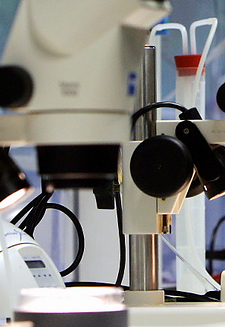Forschung
Identification of disease genes
Our focus is to identify genetic factors that cause or modify monogenic and complex diseases. Learning about the cause of a disease helps to understand, or to start to study, the subsequent disease processes and aims to develop more effective diagnostics and eventually preventive or therapeutic strategies. We use traditional linkage analyses as well as association studies either by a genome-wide approach or by testing candidate regions/genes.
In the field of monogenic diseases we are particularly interested lamin B receptor associated traits, neuromuscular and ophthalmologic disorders and cancer predispostion syndromes. However, the tools are also applicable for families who were referred from clinical departments and suffer from a wide spectrum of genetic traits. The identification of the underlying genetic causes assists physicians in predicting recurrence risk and prognosis of the particular trait.
Complex traits are harder to elucidate but highly relevant for public health.The traits we are working at, type 2 diabetes and hypertension, affect more than 10 % of the population and are major risk factors for cardiac attacks, stroke, renal failure, and others. Sophisticated technologies facilitate genome-wide association and methylation studies and even exome- or whole genome sequencing that promise higher resolution and thus probably also higher power than the traditional scans.
To increase the power, we try to lower the genetic heterogeneity by recruiting patients from isolated or founder populations where fewer genetic variants contribute to the gene pool and thus also to the pathogenetically relevant sequence variants.
For statistical analyses, we developed the software tools easyLINKAGE together with Prof. Tom Lindner and easyASSOCIATION allowing straightforward genetic analyses by users without huge experiences in statistics such as postdocs and medical doctors (like ourselves).
It is exciting to hunt down the genes but also to continue on the path studying their function. In addition to our own lab, we collaborate for experiments in other fields with scientists specialized on those topics.




